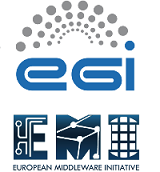Speakers
Overview
Existing workflow management systems are different in middleware, workflow engines, and workflow description languages, which are based on different formalisms. They interpret, execute and manage workflows differently, implementing diverse functionalities since they have been defined by different scientific communities. Therefore the types of workflows differ in several aspects. As a result, solving their interoperability and enabling workflow sharing are very challenging and complex tasks.
Workflow interoperability is an essential to execute workflows that span heterogeneous infrastructures and to facilitate application migration due to infrastructure and services evolution. Furthermore, interoperability facilitates workflow sharing. Sharing grid workflows has the potential to support and foster the adoption of common methodologies in science, improve efficiency and reliability by reusing validated methodology, and speeding up the design of new ones.
Description of the work
The core elements of the workshop will be based on the efforts done within the EU FP7 project called SHIWA, which aims to leverage existing workflow based solutions and enable cross-workflow and inter-workflow exploitation of distributed computing infrastructures (DCIs) by applying both coarse- and fine-grained strategies. The coarse-grained (CG) approach enables to combine workflows written in different workflow languages in order to reuse and combine existing workflow applications written in various workflow languages. The CG approach treats existing workflows as black box systems that can be incorporated into other workflow applications as workflow nodes. The fine-grained approach addresses language interoperability by defining an intermediate representation to be used for translation of workflows across various systems.
Proposed topics for the workshop session are the following:
-Workshop/Session Introduction and Motivation
-SHIWA introduction + previous work on interoperability
-Current state of the art in coarse grained interoperability (solutions and issues)
-Current state of the art in fine grained interoperability (solutions and issues)
--Introduction of IWIR + discussion: structure of IWIR as a set of areas to address and present each aspect (jobs, data and so on) as current thoughts on the language structure
-Potential User and Workflow Communities
--User communities
--Workflow communities: Available workflow systems, their languages and they available solutions to support interoperability (Pegasus, Triana, Kepler, SHIWA, P-GRADE, WS-PGRADE, TAVERNA, ASKALON, MOTEUR, GWES, etc.)
-Case studies
--Experience with workflow interoperability from workflow management point of view
--Experience with workflow interoperability from user perspective (concrete examples from pilot applications and case studies with wish list from end-users)
-Wrap up and future directions.
Impact
European research initiatives related to workflows are now entering a phase where formerly fragmented efforts have to be harmonized to strengthen their impact. Our research activity with other EGI-related projects could improve the efficiency of European Research by fostering collaboration across (i) researchers, (ii) middleware providers and (iii) resource providers.
Significant amounts of redundant efforts are found in current grid middleware development. In particular, our work has impact not only on workflow management systems (more than 30 grid workflow engines are currently being concurrently developed and maintained in Europe) but also on other middleware services such as data or job management. If users need a particular middleware feature to address their application, they will be able to move their workflows from one middleware to another as a result
of the outcome of such research activities. Main planned targets of the workshop are:
-Planning to collect people interesting in participating in a research document or in a working group to standardize workflow language interoperability.
-Contact and increase involvement of other workflow management systems:
--collect their requirements regarding fine and coarse grain interoperability
--collect key person contacts for follow up and to collect their language description
-Initiate collaboration on workflow interoperability
-Approach end-users and increase involvement with their cases studies.
URL
http://www.shiwa-workflow.eu
Conclusions
There are many different workflow management systems using a wide array of custom workflow languages. The learning curve for reusing workflows is steep because workflows typically have their own user APIs, description languages, provenance strategies, and enactment engines, which are not standard and do not interoperable. Workflow integration or reuse therefore is currently impractical, thereby inhibiting the growth in uptake and proliferation of workflows in scientific practice.
Our goal with this workshop is to leverage existing solutions and discuss cross-workflow and inter-workflow exploitation of DCIs by applying both coarse- and fine-grained strategies.
The coarse-grained approach enables to combine workflows written in different workflow languages in order to reuse and combine existing workflow applications. The fine-grained approach addresses language interoperability by defining an intermediate representation to be used for translation of workflows across various systems.

